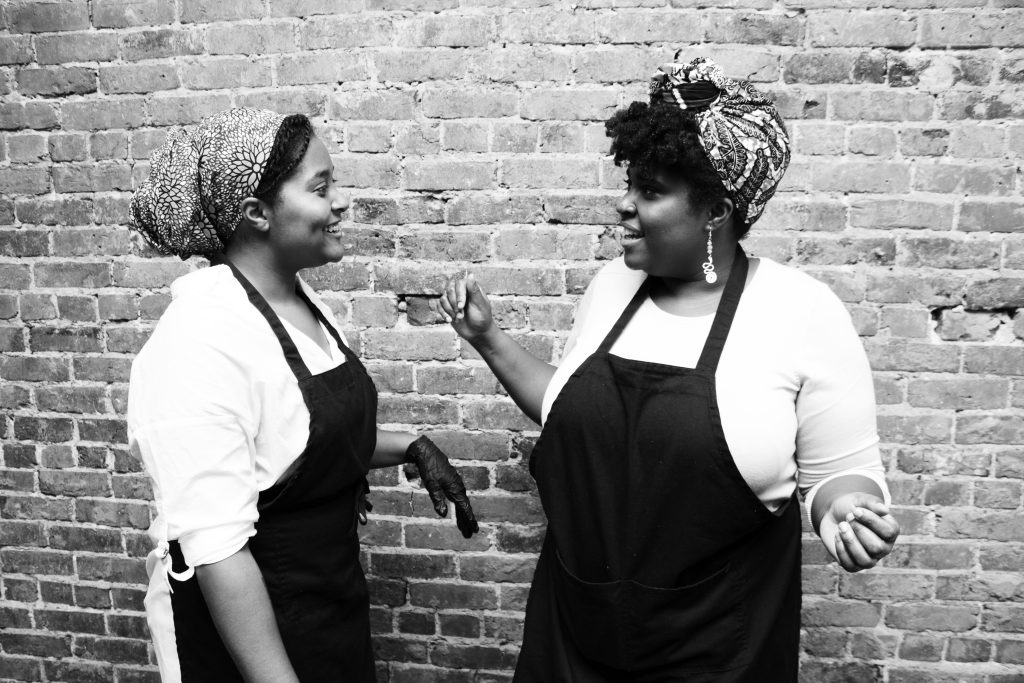May 2020

There are many things that routinely worry Courtney Smith and Erika Smith-Punches about owning Piri, an Afro-southern fusion family-run catering business in Durham, North Carolina. They worry about having enough customers. They worry about pricing their food affordably, while also being able to pay all of their staff a living wage. They worry about buying new kitchen equipment to grow their operations. In fact, the one thing that they were not worried about was a global pandemic. Yet, now that it’s here, COVID-19 has not only introduced a whole new set of challenges for Piri, but has also further exposed the systemic inequities that exist for female business owners – especially those who identify as people of color – making this time even more difficult.
“For a while we were considering shutting our doors because, as a small food business, it feels nearly impossible right now,” said Courtney Smith of Piri. “Yet, seeing how different communities are being affected by COVID-19 motivates us to stay open – we want to be there for our community.”
Across the country, COVID-19 is having a devastating effect on all small business owners, with over 50 percent of small businesses with employees (approximately four million organizations) facing immediate risk according to a recent analysis by the Brookings Institution. According to the same analysis, businesses owned by women and people of color are even more likely to suffer during COVID-19 due to historic discrimination and structural inequities in areas such as access to capital, education level, native language and immigration status. These barriers make it more difficult for leaders that identify with this group to start businesses in the first place, let alone grow those enterprises.
As an example, this structural exclusion is unintentionally showing up in the Small Business Administration’s Paycheck Protection Program. Relying on mainstream financial institutions to deliver loans to small businesses, the program favors businesses that have sizeable payrolls and large loan applications at big banks, which may put many businesses owned by women and people of color at a disadvantage because they often employ fewer people and are less likely to have extensive banking relationships. Early estimates say that nearly 90 percent of them will be denied from the program, further perpetuating the entrepreneurial inequities faced by these groups.
“I think that this really demonstrates the importance of networks and having relationships with financial institutions,” said Aliyah Abdur-Rahman, Center for the Advancement of Social Entrepreneurship (CASE) Senior Fellow for Diversity, Equity and Inclusion. “The hurdles are higher for business owners of color and the resources are just not available – how can we do more to support them?”
A team of MBA students at Fuqua worked with Abdur-Rahman to answer just that through a CASE independent study with the Culinary Femme Collective, a Durham-based group of small business owners, chefs, researchers and community organizers, including Piri, who are all dedicated to advancing femme-owned food businesses and creating a more equitable and just local food economy.
“Not only are businesses owned by women and people of color getting hit the hardest during this time, there are fundamental inequities in our food system that are leading to health disparities and causing these individuals to get hit harder by COVID-19.” said Abdur-Rahman. “We need to start addressing the root causes of these issues – specifically structural inequities and taking action to implement more sustainable models and systems – if we ever want to solve them.”
Using a lens that acknowledges these root causes of the systemic inequities in food, health and business opportunity, the independent study students framed their recommendations to the Culinary Femme Collective around the theme of business resiliency.
“From our research, we learned that resilience is about adaptability and resource reserves in an environment where the only constant is change. Locally-embedded and cooperative organizations like the Culinary Femme Collective are uniquely able to thrive in moments like this because of their deep connections to community and mutual aid provided to one another,” said Elizabeth Towell, the student project lead who is a first-year MBA student at Fuqua and the incoming CASE Fellows co-lead.
“Through this project, we were able to document how the businesses in the Collective shared knowledge as they designed new e-commerce platforms and how their relationships with local consumers provided consistent demand during COVID-19,” she continued. “The student team was able to provide best practice research on digital and social media strategies, as well as a range of pricing modules for the Femme Collective businesses to consider as they continue to evolve new capabilities in response to disruptions to their standard businesses.”
As the pandemic continues, Piri and the other businesses in the Culinary Femme Collective are continuing to build shared resiliency so that they can continue to provide food to their communities and address some of the systemic inequities. For example, Piri recently partnered with local organizations to provide free meals to seniors that are having a hard time navigating the crisis and Janee Saletta, Collective member and owner of Sour Bakery, continues to partner with farmers markets.
“I love the idea of resiliency when we talk about the Culinary Femme Collective because it has meaning beyond just the resiliency of our businesses,” said Courtney Smith of Piri. “It also means building that resilience within our community, making those connections and helping our community grow even stronger than it was before.”
Learn more about the student’s independent study and how you can support the Culinary Femme Collective.

